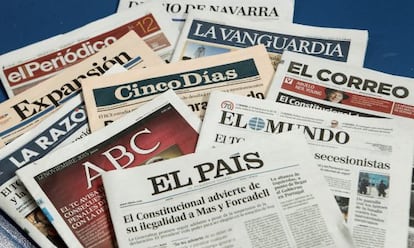Newspapers respond to charges made by ‘The New York Times’
Editors’ association defends the “quality of press freedom” in Spain

The Spanish Newspaper Publishers’ Association (AEDE) on Thursday responded to a report that appeared in The New York Times on November 5 – under the headline “Spain’s news media are squeezed by government and debt” – in which freedom of press was questioned.
The US daily wrote: “The industry here has faced a perfect storm that has included huge debts and the assertiveness of a conservative government under Prime Minister Mariano Rajoy and his Popular Party that has aggressively countered public criticism.”
At the same time, the newspaper said that these “pressures” have “sown worry” for press freedom, and it speculated whether the traditional newspapers, which were the most influential in the past, “have been brought to heel.”
The US daily “doesn’t describe the reality” of the press in Spain, says editors’ group
According to the AEDE, The New York Times provided “a caricature of the reality of news” in Spain, where major media outlets have uncovered “numerous cases of political and business corruption.”
A few, such as the Gürtel and Púnica investigations, which involved kickbacks-for-contracts schemes, are directly connected to the ruling Popular Party.
Despite a double crisis that has affected the press (economic problems and the need to move toward digital platforms), the Spanish publishers said that freedom of press has not been affected.
The New York Times makes reference in its article about the difficulties the media are facing in adjusting to digital technology and dealing with declines in advertising revenue, and reported that there are concerns over “whether Spain’s most established papers have lost their editorial independence amid the financial squeeze.”
In its statement, AEDE affirmed that the US daily “doesn’t describe the reality” of the press and considered the article “unfortunate.” The group said the report was filled with “conventionalisms without corroboration.”
Tu suscripción se está usando en otro dispositivo
¿Quieres añadir otro usuario a tu suscripción?
Si continúas leyendo en este dispositivo, no se podrá leer en el otro.
FlechaTu suscripción se está usando en otro dispositivo y solo puedes acceder a EL PAÍS desde un dispositivo a la vez.
Si quieres compartir tu cuenta, cambia tu suscripción a la modalidad Premium, así podrás añadir otro usuario. Cada uno accederá con su propia cuenta de email, lo que os permitirá personalizar vuestra experiencia en EL PAÍS.
¿Tienes una suscripción de empresa? Accede aquí para contratar más cuentas.
En el caso de no saber quién está usando tu cuenta, te recomendamos cambiar tu contraseña aquí.
Si decides continuar compartiendo tu cuenta, este mensaje se mostrará en tu dispositivo y en el de la otra persona que está usando tu cuenta de forma indefinida, afectando a tu experiencia de lectura. Puedes consultar aquí los términos y condiciones de la suscripción digital.








































